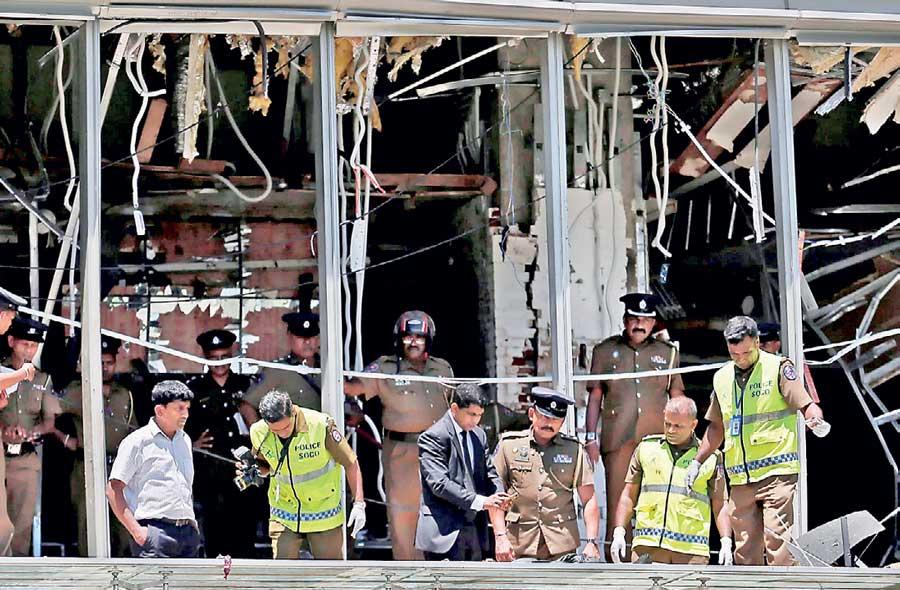18 Jun 2019 - {{hitsCtrl.values.hits}}

 Could Sri Lanka have prevented the Easter Sunday terror attacks that claimed 257 lives? Most media reports in the aftermath of the attack have suggested so.
Could Sri Lanka have prevented the Easter Sunday terror attacks that claimed 257 lives? Most media reports in the aftermath of the attack have suggested so.
It has been argued that if the Sri Lankan authorities acted upon the multiple intelligence briefings provided by India, the nine suicide bombers would not have been successful or the impact of the attacks could have been drastically minimised.
Much of this has been adequately deliberated upon and Sri Lankan authorities have admitted to their lapses. The impact of the attacks on regional counter-terrorism cooperation in South Asia is uncertain.
Will the region realise the gravity of evolving transnational security threats and activate a regional approach to deal with them? Or will it continue to fall back on unitary or at best, bilateral measures?
Indications of how things may evolve in the future lie in some of the past counter-terrorism successes achieved through bilateral mechanisms rather than through the dysfunctional and antiquated South Asian Association for Region Cooperation convention on suppression of terrorism.
Examples of bilateral counter-terrorism cooperation include the arrest of Indian Mujahideen leader Yasin Bhatkal in Nepal in 2013 and the launch of an operation in 2003 in Bhutan on camps of Indian insurgents. Sri Lanka’s victory over the Liberal Tigers of Tamil Eelam in 2009 with the assistance from India is another instance of two countries seeking each other’s help to deal with security threats.
India launched two surgical strikes on terrorist facilities inside Pakistan in 2016 and 2019 after repeated threats from Pakistan-based terrorist groups active in Kashmir. In the absence of a shared vision of regional security, South Asian countries have preferred to use unitary or bilateral instruments to deal with the threat of terrorism.
Counter-terrorism cooperation between India and the United States, United Kingdom, Australia, Israel and the Arab countries has made up for the absence of a regional counter-terrorism architecture in South Asia. Real-time intelligence exchange has remained the hallmark of such cooperation. Its absence, especially in cases like Sri Lanka, where internal cohesion and communication between the country’s agencies was clearly lacking, can determine security outcomes.
In the aftermath of the Easter attacks in Sri Lanka, the so-called Islamic State (IS) claimed the attacks and subsequently announced the establishment of two new provinces — a Pakistani province and an Indian one. This breaks down the existing IS subgroup, Wilayat Khorasan, into three sub-provinces, focusing individually on Afghanistan, Pakistan and India.
Aside from Afghanistan, the IS attempt to find a base in South Asia has failed due to its inability to carry out sustained operations or gather followers. The attacks in Sri Lanka and the explosion on May 27, 2019 in Bangladesh may spur a new wave of radicalisation across the region, marked by religious and sectarian fissures.
As transnational linkages to the Easter Sunday suicide bombers continue to emerge, India’s National Investigation Agency has started investigations into two IS-related cases that they believe are connected to the attacks in Sri Lanka. One case pertains to an alleged conspiracy to kill Hindu leaders in Coimbatore, Tamil Nadu. The other is concerned with the links between an Indian IS recruit deported to Sudan in 2015 and the cyber entity Aadhil AX. Investigators believe that the Sri Lankan software engineer Aadhil Ameez, who was arrested after the Easter Sunday attacks, could in fact be Aadhil AX.
Threats to national security from radicalised subjects inside a country in South Asia, with possible ideological or logistical linkages to a neighbouring country, may increase. Terrorists may seek to take advantage of the lax security laws and inadequate preparedness of some countries in the region to plot their actions in others.
India’s National Security Advisor underlined that the future challenges in the security and defence domain could be ‘grave’. It is in this context that cooperation between the countries of the region under a regional counter-terrorism architecture may be able to fill up the existing gaps. Such an architecture will have to be built on a shared vision of South Asian security and needs to be supported by mechanisms and structures that facilitate such cooperation on a regular basis. This, however, is easier said than done.
(Dr. Bibhu Prasad Routray is Director at Mantraya, an India-based research forum on security, non-traditional threats and foreign policy)
10 Jan 2025 10 minute ago
10 Jan 2025 2 hours ago
10 Jan 2025 2 hours ago
10 Jan 2025 3 hours ago
10 Jan 2025 4 hours ago